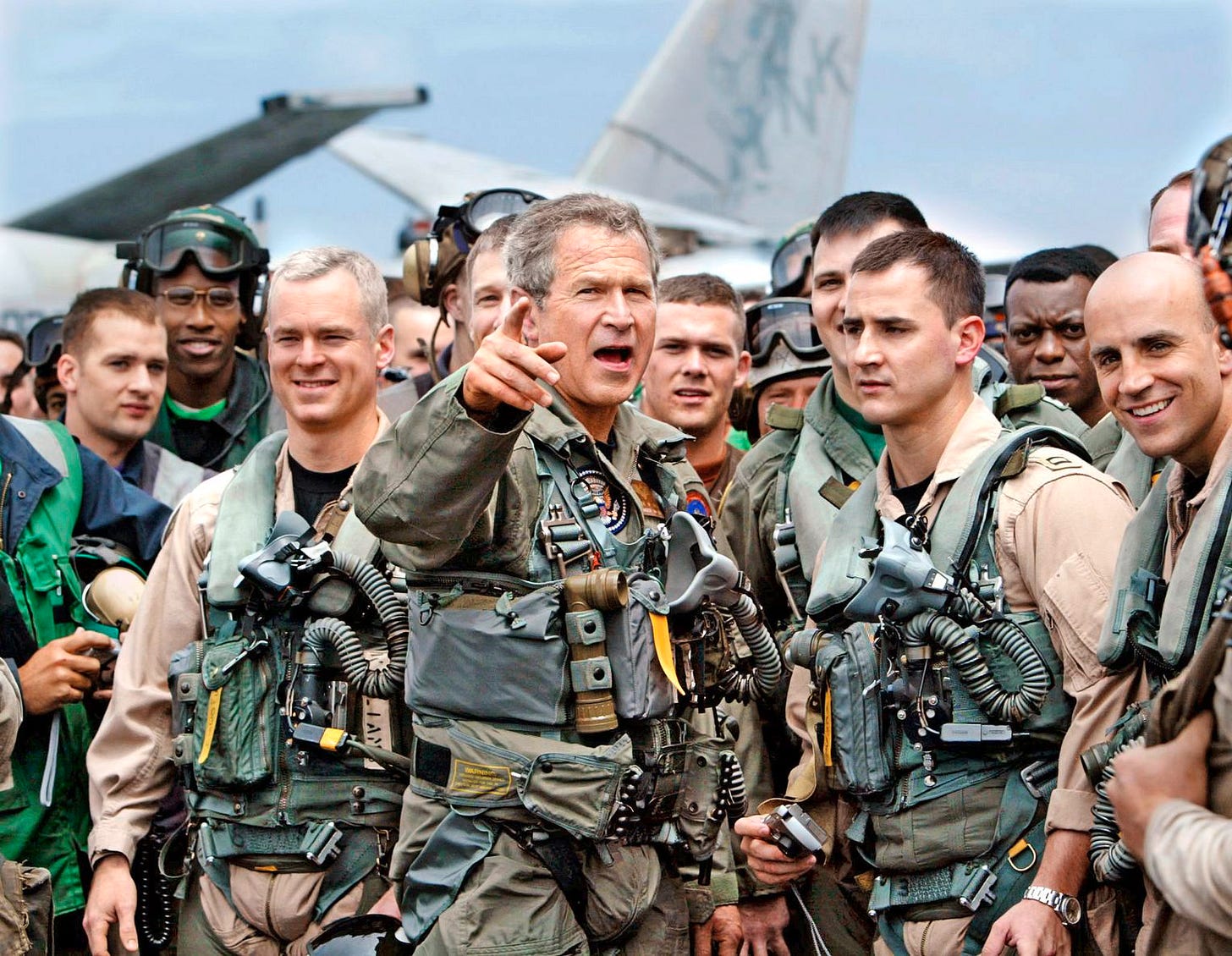You're invited, this time for real!
Description
Okay, we’ve sorted this out. Adam will be joining us tomorrow, Sunday November 2, at 4:30 pm Paris time, to discuss the Iraq War. Please double check to be sure you’re joining at the right time in your time zone—France recently went on Daylight Savings Time, so you’ll want to use this time clock to figure out what time that is where you live.
I’ll re-copy the invitation, and the Zoom link, below. Looking forward to seeing you.
Adam Garfinkle—whose work you’ve admired at the Raspberry Patch—will be joining ME201 tomorrow, Sunday November 2, at 4:30 pm Paris time to discuss the United States’ decision to go to war in Iraq in 2003.
He had a good view: He was a speechwriter for Secretaries of State Colin Powell and Condoleezza Rice. In fact, for those of you who aren’t as familiar with him as the class, here’s his full bio. (It’s from Wikipedia, so I can’t vouch for every detail, but it looks right in general).
Adam M. Garfinkle is an American historian and political scientist and the founding editor of The American Interest, [which was] a bimonthly public policy magazine. He was previously editor of The National Interest. He has been a university teacher and a staff member at high levels of the US government. He was a speechwriter to more than one US Secretary of State.
Early in his career, Garfinkle worked at the Foreign Policy Research Institute (1972–1978 and from 1981). He taught American foreign policy and Middle East politics at the University of Pennsylvania(1980–1989) and Johns Hopkins University’s School of Advanced International Studies. He has also taught at Drexel University (1980), Widener College (Chester, Pennsylvania) (1981), Haverford College (1991), and Tel Aviv University (1992–1993). He served on the staff of the National Security Study Group of the US Commission on National Security/21st Century (the Hart-Rudman Commission), as an aide to General Alexander M. Haig, Jr. (1979–1980), and an assistant to Senator Henry M. Jackson (1979). As of 2009, he was a member of the project “Middle East at Harvard” (MESH). Garfinkle has a B.A., M.A. (both 1972), and Ph.D. (1979) in International Relations from the University of Pennsylvania.
I thought this conversation might be particularly interesting to all of our subscribers, so I wanted to invite everyone, even if you don’t usually attend. The Zoom link is below the paywall, at the end of this newsletter. (If you can’t make it at that time, don’t fret—I’ll post the video.)
He’s asked the class to read the following in preparation. If you’re not in the class, you’re of course not obliged to do the reading beforehand, but please give priority in the discussion to the regular class members, who have:
Drinking the Kool-Aid, by W. Patrick Lang, Middle East Policy, Summer 2004
… What does drinking the Kool-Aid mean today? It signifies that the person in question has given up personal integrity and has succumbed to the prevailing group-think that typifies policymaking today. This person has become “part of the problem, not part of the solution.”
What was the “problem”? The sincerely held beliefs of a small group of people who think they are the “bearers” of a uniquely correct view of the world, sought to dominate the foreign policy of the United States in the Bush 43 administration, and succeeded in doing so through a practice of excluding all who disagreed with them. Those they could not drive from government they bullied and undermined until they, too, had drunk from the vat.
What was the result? The war in Iraq.
Spies, Lies, and Weapons: What Went Wrong, by Kenneth Pollack. How could we have been so far off in our estimates of Saddam Hussein’s weapons programs? A leading Iraq expert and intelligence analyst in the Clinton Administration—whose book The Threatening Storm proved deeply influential in the run-up to the war—gives a detailed account of how and why we erred:
… Figuring out why we overestimated Iraq’s WMD capabilities involves figuring out what the Iraqis, especially Saddam Hussein, were thinking and doing throughout the 1990s. The story starts right after the Gulf War. An Iraqi document that fell into the inspectors’ hands revealed that in April of 1991 a high-level Iraqi committee had ordered many of the country’s WMD activities to be hidden from UN inspectors, even though compliance with the inspections was a condition for the lifting of economic sanctions imposed after the invasion of Kuwait. The document was a report from a nuclear-weapons plant describing how it carried out this order. According to UNSCOM’s final report, “The facility was instructed to remove evidence of the true activities at the facility, evacuate documents to hide sites, make physical alterations to the site to hide its true purpose, develop cover stories, and conduct mock inspections to prepare for UN inspectors.”
Confronting Saddam Hussein: George W. Bush and the Invasion of Iraq, by Melvyn P. Leffler. (I have a PDF version if anyone would like it):
In Confronting Saddam Hussein, the eminent historian of US foreign policy Melvyn P. Leffler analyzes why the US chose war and who was most responsible for the decision. Employing a unique set of personal interviews with dozens of top officials and declassified American and British documents, Leffler vividly portrays the emotions and anxieties that shaped the thinking of the president after the shocking events of 9/11. He shows how fear, hubris, and power influenced Bush’s approach to Saddam Hussein’s Iraq. At the core of Leffler’s account is his compelling portrait of Saddam Hussein. Rather than stressing Bush’s preoccupation with promoting freedom or democracy, Leffler emphasizes Hussein’s brutality, opportunism, and unpredictability and illuminates how the Iraqi dictator’s record of aggression and intransigence haunted the president and influenced his calculations.
Bush was not eager for war, and the decision to invade Iraq was not a fait accompli. Yet the president was convinced that only by practicing coercive diplomacy and threatening force could he alter Hussein’s defiance, a view shared by British Prime Minister Tony Blair and other leaders around the world, including Hans Blix, the chief UN inspector. Throughout, Leffler highlights the harrowing anxieties surrounding the decision-making process after the devastating attack on 9/11 and explains the roles of contingency, agency, rationality, and emotion. As the book unfolds, Bush’s centrality becomes more and more evident, as does the bureaucratic dysfunctionality that contributed to the disastrous occupation of Iraq.
This should be interesting. See you there!
If you haven’t yet subscribed, please do so to see the link to the discussion, below, and to get access to all of our archives, podcasts, and videos; invitations to more discussions and Zoom calls like this; and many other magnificent benefits you’ll receive by being a paid subscriber, including my gratitude.
By the way, have you checked out the founding member benefits? Founding members get a custom Paris tour when next they’re in town, organized around their topic of choice: Paris through the eyes of the Impressionists! The French Revolution! Paris by smell! Paris’s best patisseries! Its






